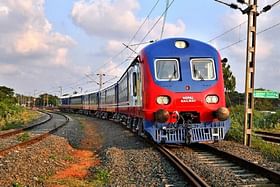India and Bhutan are soon going to be linked by a 57.5-km railway link, between Assam’s Kokrajhar and Bhutan’s Gelephu.
Addressing the media on Monday (7 August), External Affairs Minister S Jaishankar said, “We are in talks on the rail link between Bhutan and Assam. Bhutan is very keen to open more points for tourists and it is very good for Assam.”
Nestled in the Himalayas, Bhutan serves as a buffer between India and China, and shares border with four Indian states — Assam, Arunachal Pradesh, West Bengal and Sikkim.
To be funded by the Indian government, the first-ever railway connection between India and Bhutan is expected to be completed by 2026.
As a landlocked country, the only transportation link between Bhutan and India for export and import is through road networks. This single dependency on roads creates a great deal of economic inefficiencies and as a result high transportation and logistical costs.
In order to ease the connectivity for the landlocked country, India and Bhutan on 25 January 2005, signed a landmark accord for establishing rail links between bordering towns.
Under the memorandum of understanding, inked in the presence of the former Indian prime minister Manmohan Singh and His Majesty of Bhutan, the Fourth Druk Gyalpo, the two sides agreed to conduct feasibility studies for the extension of the Indian Railways network from West Bengal and Assam to the nearest border towns of Bhutan.
The first ever public acknowledgement of the talks of railway connectivity between the two countries came in December 2022, when Bhutan’s Foreign Minister Dr Tandi Dorji, in an exclusive interaction with a news agency said that his country is holding discussion on railway connectivity with India, something that will “integrate trade and commerce”.
According to Dorji, the Bhutan government will first work on this project and then look at connecting other regions like Samtse, Phuentsholing, Nganglam, and Samdrupjongkhar.
The Kokrajhar-Gelephu railway initiative, which will be a historical milestone in the Bhutan-India relations, will further integrate trade and commerce, as well as, people to people relationships.


